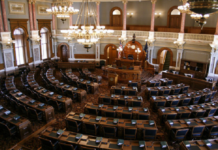(Updated to include comments from the governor, the governor’s chief of staff and Republican House leadership)
Legislative leaders are going to let Gov. Laura Kelly’s COVID-19 emergency declaration lapse without meeting to take up the issue.
The Legislative Coordinating Council – made up of the Legislature’s top leaders – will not meet as planned on Tuesday afternoon.
The decision not to meet effectively brings an end to the governor’s emergency declaration to address the COVID-19 pandemic after 15 months.
The announcement not to hold the meeting drew criticism from a Democratic lawmaker, who suggested that Republicans met behind doors to reach their decision.
Senate President Ty Masterson, Majority Leader Larry Alley and Vice President Rick Wilborn issued a statement explaining the decision to cancel the meeting.
“At last month’s LCC meeting, a majority of legislative leaders made it clear that June 15 was likely to be the end of the state of emergency – that after 15 months, it is time for Kansas to return to normal,” they said.
“As such, the LCC recommended the governor develop an exit strategy to end the emergency – however, after reviewing the governor’s letter, it appears the governor opted for an extension strategy,” they said in their statement.
The governor had sought a 30-day extension with the goal of ending emergency operations by the end of August.
She said the decision not to grant her request was political partisanship.
“A state disaster response has never been, and should not be, political,” Kelly said in a statement.
“The actions by a select few Republicans in the Legislature will make our response more difficult.”
Will Lawrence, the governor’s chief of staff, told reporters that the governor would press forward with dealing with the pandemic-related issues facing the state.
“Gov. Kelly will find a way to continue to do the things that we need to do,” Lawrence said.
“She’s been doing this since day one of the pandemic, unfortunately the Republican Legislature and Republican leadership has been a barrier and an obstacle.”
Democratic state Rep. John Carmichael of Wichita criticized the process, saying that the LCC should have held an open meeting to discuss why it wasn’t extending the order.
“I personally believe the LCC is making a big mistake here,” he said.
“Their failure to even hold a public meeting to discuss this is even more concerning than anything else that they’ve done,” he said.
“They’ve apparenltly made up their mind behind closed doors that we don’t need an emergency declaration any more in Kansas,” he said.
It was view expressed by Senate Minority Leader Dinah Sykes Tuesday afternoon.
“We didn’t get to have an honest conversation,” she said.
“They decided to do this really (in) a back-door deal between themselves without having us at the table to discuss this,” she said,
Emergency declarations have already been ended in more than a half-dozen states.
Last week, the Pennsylvania legislature ended Democratic Gov. Tom Wolf’s emergency declaration.
The state of emergency that had been in place in Massachusetts for the last 15 months ended after midnight today.
Other orders have ended in South Carolina and New Hampshire as well.
Meanwhile, in North Carolina, Democratic Gov. Roy Cooper extended that state’s emergency declaration until July 30.
Hawaii Gov. David Ige recently extended that state’s emergency declaration until Aug. 6.
The Kansas governor had sought to extend the disaster declaration until July 15 with the eventual goal of winding down emergency operations by the end of August.
But lawmakers had become increasingly frustrated with repeated extensions of the disaster declaration over the last 15 months.
It always had appeared that it would be difficult to get the latest extension.
House Majority Leader Dan Hawkins was adamantly opposed to extending the declaration, making it unlikely that other House Republicans would side against him.
If House leadership opposed the extension, that made it even more unlikely that Senate Republicans would disagree.
The decision to allow the declaration to expire means the end of the last nine executive orders that remained in place to address the fallout of the COVID-19 pandemic.
Executive orders waiving the one-week waiting period for unemployment benefits and extending the deadline for renewing driver’s licenses and identifications cards would end immediately, among others.
The end of the resolution also would end an order that would allow contract nurses to perform vaccinations more easily.
It also allows to expire another order that requires COVID-19 testing in certain adult care homes licensed by the state.
Kelly had wanted to keep those executive orders in place in an effort to get more Kansans vaccinated and keep nursing homes safe.
Without the testing requirement for nursing homes, the state’s ability to protect the health and safety of staff and residents would be compromised, she said.
The governor said the executive order related to contract nurses is important in ongoing efforts to get Kansans vaccinated.
The contract nurses, the governor said, have already administered 45,981 vaccines.
The state has already completed vaccine clinics at 47 employers across the state with more than 40,000 Kansans getting inoculated.
There are 12 more employers who have requested vaccination clinics for their nearly 5,000 employees that are being scheduled.
The state also has scheduled 20 more community vaccination clinics already between June 12 and July 27, 2021.
The vaccination rate has been declining in Kansas since reaching a peak of average of about 28,000 vaccinations a day on April 4, according to Bloomberg’s vaccine tracker.
The state is now averaging about 6,300 a day, according to Bloomberg.
At its current pace, Kansas is not projected to cover 75% of its population for another nine months, the data shows.
Currently, state data show that 43% of Kansans have been vaccinated with one dose and 37% have received both doses.
The Kelly administration said the end of the emergency declaration would mean the state would lose its emergency allotment of benefits from the Supplemental Nutrition Assistance Program, the formal name for food stamps.
The governor said the state would lose $14.5 million in additional benefits that would affect 63,000 households.
“While many of the elements of our emergency response from last summer are no longer essential, the disaster declaration itself is still essential,” the governor wrote in a letter to lawmakers last week.
House Republican leadership – Hawkins, Speaker Ron Ryckman Jr., and Speaker Pro Tem Blaine Finch – issued a statement arguing against the need for the declaration.
“The remaining goal to make vaccines available to all Kansans who want them is one that our state can achieve without emergency measures and executive orders,” they said in their statement.
“There are adequate medical personnel to meet the current demand for vaccines and the regular authority available to the governor under the laws of our state is sufficient to meet these needs,” they said.
Lawrence said one big change with the end of the emergency declaration would be the inability to use the National Guard to respond to the pandemic as it slowly recedes.
The National Guard has administered 122,323 vaccines, with 4,360 of those being administered since May 28.
Further, the National Guard has tested more than 30,603 individuals and transported over 26,304 samples to Kansas Health and Environment Laboratories, with 297 of those samples since May 28.
“It just means that we’re going to have to find other ways to do it with other personnel,” Lawrence said.
He indicated that the state health department would have to pick up some of those responsibilities going forward.
“The governor is going to continue to find ways to vaccinate Kansans and provide them the opportunity to get vaccinated,” he said.
“There are still people getting sick, there are still people dying and we still have a lot of work to do on this front,” he said.
“And (GOP lawmakers) are just choosing to make it harder for reasons that I can’t really fathom, other than it is getting to be campaign season for some of them.”













